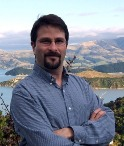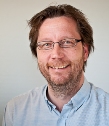Aaron Packman (USA)
Presentation topic:
Overview of surface-groundwater interactions in the context of
river
degradation, water quality, and ecosystem processes |
 |
Dr.
Aaron Packman is a Professor in the Department of Civil and
Environmental Engineering, McCormick School of Engineering and Applied
Sciences, Northwestern University. His research focuses on
environmental and microbial transport processes, with particular
emphasis on understanding the basic processes that control interfacial
transport in aquatic systems and the coupling of physical transport
processes with biological and biogeochemical processes in dynamic
natural environments such as rivers. Dr. Packman’s work is highly
collaborative and encompasses basic fluid mechanics, particle transport
and morphodynamics, microbiology, and aquatic and surface chemistry.
Important applications include contaminant transport and water quality,
microbial habitat conditions and benthic microbial ecology, nutrient and
carbon cycling, ecosystem degradation and restoration, control of
biofilm-based infections, and the transmission of waterborne disease.
Dr. Packman has received several awards for his work, including Career
awards from the U.S. National Science Foundation and National Institutes
of Health, and the Huber Research Prize from the American Society of
Civil Engineers. He is currently an associate editor for the leading
aquatic sciences journal Limnology and Oceanography – Fluids and
Environments, and is the Vice-President of the International
Association for Sediment Water Science. He is also very active on
technical committees and panels addressing sediment contamination,
hydrologic synthesis, and waterborne disease transmission.
|
Per Gustav Stålnacke (Norway)
Presentation topic:
How slow can it be? Spatial and temporal considerations on
nutrient
retention from source to river mouth |
 |
Dr. Per
Stålnacke is the head of the department of 'Water quality and hydrology'
at Bioforsk Soil and environment in Norway and also vice-president of
the IAHS ICWQ. His research interest is on integrated water resources
management and the policy-science interface. Besides, he has
considerable experiences in assessments of nutrient fluxes at a river
basin scale. There is, according to him, a huge research need to better
quantify the hydrological pathways and development of better tools to
assess and improve the understanding of how long it can take before we
can observe improved water quality due to implemented mitigation
measures. These are the apparent needs in relation to the WFD and the
HELCOM BSAP. Stålnacke will in his presentation show and discuss some
very recent results on nutrient retention in the Baltic Sea drainage
area and time trends in selected rivers in Baltic Sea and Europe.
|